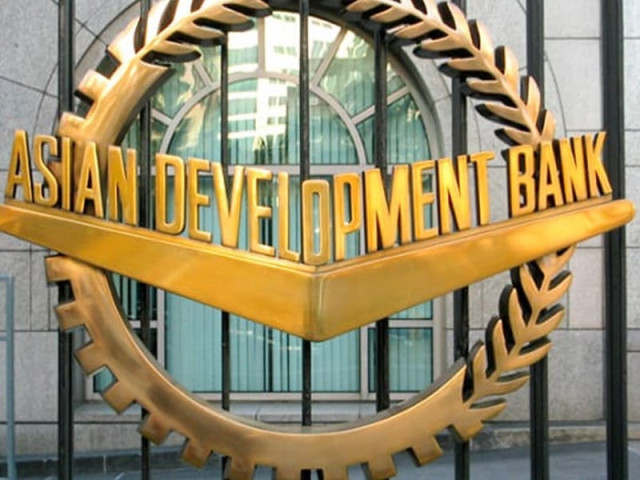ADB raises Pakistan's growth forecast to 3%
Lowers inflation projection as industrial activity recovers; major macroeconomic targets yet to be achieved

The Asian Development Bank (ADB) on Wednesday raised Pakistan's growth forecast to 3% and cut its inflation projection to 10%, citing a rebound in industrial activities due to relaxed import restrictions and improved access to foreign exchange.
In its flagship publication, Asian Development Outlook, the Manila-based lender noted that Pakistan's agriculture sector would weaken due to the poor output of two key cash crops, wheat and cotton. The 3% growth rate is still lower than the official target of 3.6%, indicating the government's inability in achieving major macroeconomic goals.
The report was released the same day the ADB approved two new loans for Pakistan totalling $530 million. The loans will provide cash handouts to beneficiaries of the Benazir Income Support Programme (BISP) and support improvements in the power distribution network. Pakistan's growth for fiscal year 2024-25 is projected at 3%, revised upwards from 2.8% in September. However, this rate remains lower than the government's target.
The ADB stated that greater macroeconomic stability following the approval of the new International Monetary Fund (IMF) programme in September will aid recovery. It added that industrial output growth is projected to accelerate with the suspension of import management measures, increased investor confidence, and easier access to foreign exchange. A more accommodative monetary policy, driven by faster-than-expected easing of inflationary pressures, is also expected to support economic activity through increased private investment, the report said.
However, agriculture growth is forecast to weaken due to heavy monsoon downpours during JulySeptember 2024, which caused flood-like conditions in parts of the country. Wheat and cotton, two of Pakistan's five major crops, are projected to perform poorly this fiscal year.
The report further revised Pakistan's inflation forecast for fiscal year 2024-25 to 10%, down from the earlier estimate of 15%. Consumer Price Index (CPI) inflation decelerated to a six-year low of 4.9% in November due to "high base effects, the impact of contained demand-side pressures, improved supplies of major food items, more favourable global commodity prices, and a delay in upward adjustments in administered energy prices."
The ADB also highlighted a sharp drop in rice prices in October after India lifted its export ban on non-basmati white rice in late September. With India re-entering the market, prices for rice exports from Thailand, Vietnam, and Pakistan fell significantly as competition intensified, easing recent price pressures. While the ADB raised Pakistan's growth forecast, it lowered India's projection from 7.2% to 7%, citing weaker manufacturing sector performance and slower government spending.
The ADB said that Asia and the Pacific's economic growth would remain steady this year and next, but potential US policy changes under the incoming administration of President-elect Donald Trump might affect the region's long-term outlook. It stated that changes to US trade, fiscal, and immigration policies could slow growth and add to inflation in developing Asia and the Pacific. Since these significant policy changes are expected to take time and be rolled out gradually, their effects on the region are likely to materialise from 2026. However, earlier impacts could arise if the policies are implemented rapidly or if US-based companies front-load imports to avoid potential tariffs, the report noted.
Loan approvals
The ADB approved $330 million in additional financing to strengthen Pakistan's federally administered social protection programs and services, according to a statement issued by the lender.
The result-based loan for the ongoing Integrated Social Protection Development Programme (ISPDP) aims to expand grassroots-level social protection to alleviate poverty among poor women and their families. The $330 million programme will enhance the institutional capacity of BISP, enabling it to transition to adaptive and climate-resilient social protection. This will include improving education pathways for children and youth from poor families and increasing access to health services and nutritional supplies for disaster-prone areas.
Separately, the ADB approved a $200 million loan to modernise Pakistan's power distribution infrastructure and improve the ability of distribution companies to deliver reliable electricity.
The ADB's Power Distribution Strengthening Project will upgrade and modernise systems to meet the country's growing electricity demand. In its initial phase, the project will support three major distribution companies: Lahore Electric Supply Company (LESCO), Multan Electric Power Company (MEPCO), and Sukkur Electric Power Company (SEPCO). The project includes installing at least 332,000 advanced metering systems, data management and communication systems, and 15,800 online transformer performance monitoring systems in LESCO, MEPCO, and SEPCO.
Additionally, the voltage of four grid stations in SEPCO will be upgraded from 66 kilovolt (kV) to 132 kV, a critical enhancement to reduce transmission losses and address rising electricity demand
In LESCO, at least 25 grid stations will be constructed and modernised with the provision of essential equipment. High-loss 11 kV feeder lines will be replaced with aerial bundled conductor cables, and feeder line configurations will be improved.
These upgrades will reduce losses, enhance revenue collection, and provide distribution companies with real-time data on electricity consumption and grid performance, said ADB Principal Energy Specialist Seung Duck Kim.



















COMMENTS
Comments are moderated and generally will be posted if they are on-topic and not abusive.
For more information, please see our Comments FAQ